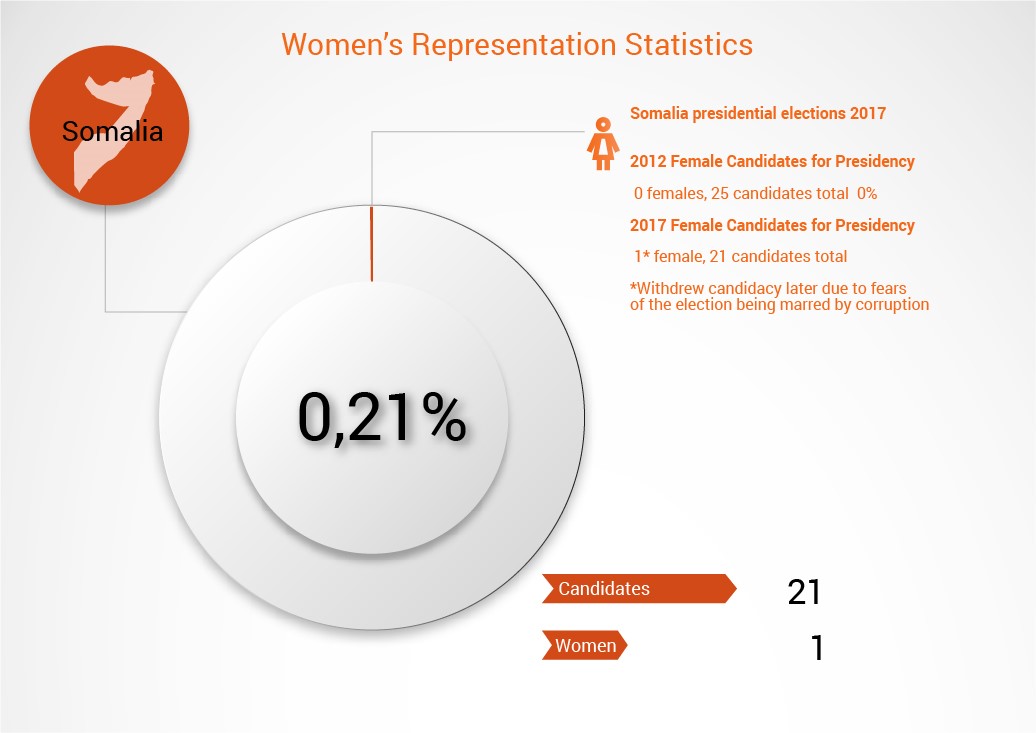Parliamentary elections in Somalia took place on the 8th of February, 2017.
Mohamed Abdullahi Mohamed was elected President of Somalia. Mohamed was a former Prime Minister, and beat the now ex-President Hassan Sheikh Mohamud. Mohamed obtained 184 votes, compared to 97 for the outgoing president, who accepted defeat, avoiding a third and final vote.
The Somali parliament is split into two: the House of the People, which has 275 members, and the Senate, which has 84 members. In total, there are 35 women parliamentarians, a big achievement considering Somalia’s background as a clan-based political system. Somalia is a Federal Parliamentary Republic. The President is selected for a term of four years, and can be re-elected only once. As a full election with a vote for all adults was considered impractical for security and institutional reasons, the President was selected by members of a bicameral national assembly picked by 14,000 delegates chosen by tribal elders. There are expectations for full suffrage and democracy in the country by the next elections in 2020. The election, which was initially scheduled for August 2016, was delayed due to a number of security reasons including clan disputes, fraud accusations and organisational challenges. More than 20,000 African Union (AU) troops were stationed in Somalia to prevent militant Islamist group al-Shabab from overthrowing the weak government. The election was seen as part of a complex process to help Somalia rebuild its democracy after years of war and achieve stability.
Out of the 20 Presidential candidates who stood for the elections, only one was a woman. The constitution currently stipulates that women need to make up at least 30% of the seats in Parliament. However, there are no policies or laws in place which protect this quota.
Women’s Political Participation:
In November 2015, Fadumo Dayib, a public health expert and activist, became the first woman ever to run for President in Somalia. Her decision to stand for the presidency also attracted death threats from the militant group al-Shabaab, considered one of many challenges to women’s political participation in the country. Her policy platform included taking on the clan system and traditions such as female genital mutilation; zero tolerance for corruption; telling neighbouring countries to respect Somalia’s territorial integrity and a dialogue with al-Shabaab if the extremists lay down arms, stop killing Somalis and cut ties to international terrorist organisations.
With regards to the status of women outside of the political sphere and based on our findings in the AWD report, Somalia is considered to be one of the hardest places in the world for women. Despite the lack of extensive data, research has found that conflict and insecurity are negatively affecting women’s safety, well-being, and economic opportunities. The collapse of the state has led to an emphasis on customary, sharia law and clan rule, which are not in favour of women’s rights. Prevalence of child marriage, female genital mutilation (FGM), violence against women in the form of sexual violence and rape is high, along with low employment and education rates. Somalia has not yet ratified the Maputo Protocol nor the CEDAW.
Conclusion:
Embroiled in conflict for over more than 20 years, Somalia, since 2012, has been inching towards stability with a new internationally-backed government. Hence, a major challenge for Somalia remains fighting insecurity in the country. Accordingly, it is crucial to include women in the public sphere. Firstly, gender quotas must be ensured so there is 30% of women delegates to elect the lower and upper houses. Efforts must be made to build the capacity of women political candidates and equip them with tools and skills in order to ensure their political participation. Furthermore, support in the form of capacity development must be granted to gender activists and civil society organizations. In addition, the engagement of men and boys in combatting violence against women and girls must not be neglected.

